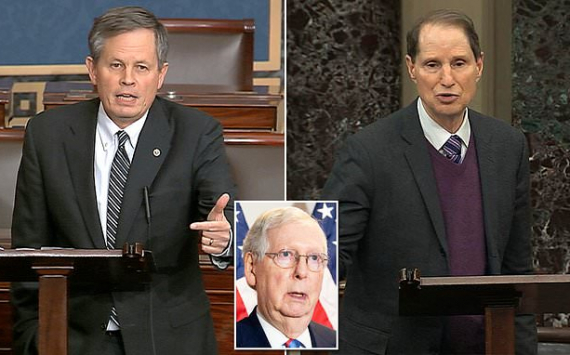
The Senate on Wednesday passed an amendment to provide additional legal protections to targets of Foreign Intelligence Surveillance Act warrants and nearly approved new restrictions on the federal government's power to search internet history in a sign of bipartisan frustration over surveillance authorities under the FISA law.
The amendment votes occurred ahead of the Senate's expected passage Thursday of a bill to reauthorize three FISA surveillance authorities that lapsed in March.
The Senate easily approved an amendment from Republican Sen. Mike Lee of Utah and Democratic Sen. Patrick Leahy of Vermont that added additional protections in the FISA court for targets of surveillance warrants, 79-11. An amendment from GOP Sen. Steve Daines of Montana and Democratic Sen. Ron Wyden of Oregon was defeated by the narrowest of margins, falling one vote short of the 60 needed to pass, 59-37. The senators' amendment would have restricted the searches of browser and search history under FISA's Section 215, which grants federal authorities the ability to obtain tangible things under the FISA law in national security investigations.
Of the four senators who missed that vote -- Sens. Patty Murray of Washington state, Bernie Sanders of Vermont, Ben Sasse of Nebraska and Lamar Alexander of Tennessee -- at least one would have voted in favor. Murray's spokeswoman confirmed she backed the amendment, but was flying back to Washington, DC, from Washington state.
The Senate has scheduled at least one more amendment vote on Thursday from Sen. Rand Paul, a Kentucky Republican, which would require a warrant for US citizens to be searched under FISA.
The amendment that was adopted from Lee and Leahy makes it easier for the FISA court to have an outside review of cases seeking warrants on US citizens.
"Insofar as we decide to have these programs, we've got to have someone accountable in them," Lee said Wednesday. "We've got to have a process by which the information brought to bear within the FISA court are accountable and reviewable by someone."
The Senate's amendment to the legislation means the House, which struck the deal to reauthorize the authorities, will need to vote on the measure again before it goes to the President's desk.
The House's bill drew objections from civil libertarians who argued the bipartisan agreement that was reached trampled over individual rights.
"Back in 2001 when Congress passed the Patriot Act, Americans were rightly concerned about the government collecting their library borrowing records without a warrant," Wyden said on the floor Wednesday. "What we're talking about here today, looking at web history browsing history, it is thousands of times more invasive of privacy."
The three surveillance authorities reauthorized by the legislation have lapsed for nearly two months after the House and Senate failed to agree on how to extend them in March while the coronavirus outbreak sent lawmakers scrambling out of Washington. The Senate's vote on Thursday would reauthorize the provisions from the USA Freedom Act, which was signed into law in 2015 to reform the 2001 Patriot Act.
The House approved the legislation in March by a broad bipartisan margin -- a rare occurrence for the current Congress. It was especially striking given the legislation deals with the court that authorized FBI surveillance of a Trump campaign adviser in 2016 in an episode that has roiled President Donald Trump, and the negotiations involved Attorney General William Barr and some of the lawmakers who have been fighting over the FBI's Russia investigation for years.
The legislation will reauthorize central elements of three expiring provisions of the surveillance law, while adding in some new privacy protections like a restriction on cell phone location data. While the three expired authorities are unrelated to the FISA court system, the bill also makes changes to the FISA court system to address findings of misconduct by the FBI over their requests to surveil Carter Page, the former Trump campaign adviser. The legislation includes changes to require the attorney general to sign off on FISA applications dealing with elected officials and federal candidates and allowing independent monitors to review FISA applications.
In addition, the legislation formally ends the National Security Agency's bulk phone data collection, which the NSA has already stopped using.
Meanwhile, the FBI has been carrying out a number of changes internally to their protocols regarding requests from the FISA court since the stinging findings about Page were released in a report by the Justice Department's inspector general late last year. On Wednesday, the bureau's top lawyer told the FISA court that FBI Director Christopher Wray had recently named a senior adviser to oversee the implementation of the fixes. The bureau has also produced new, more comprehensive training programs that deal with the FISA application process and study certain problematic case studies, which FBI personnel will have to complete in the coming weeks, FBI General Counsel Dana Boente wrote in the filing.
FISA opponents say the legislative reforms don't go nearly far enough, with opposition in Congress among both liberal Democrats and libertarian-leaning Republicans.
Paul, who's long fought his party as an advocate for civil liberties, criticized the bill and told reporters ahead of Wednesday's votes he would urge the President to veto it if it passes the Senate without the amendments, though he acknowledged the slim prospect of that.
"I'll encourage him publicly to veto it if they don't fix it. I don't have a great deal of hope that that will happen," Paul said. "I think that it's a disservice to the people who have worked so hard to support the President if we allow FISA to stand and do this to another President in the future. We'll have missed a great opportunity for fixing it."
Barr played a key role among the odd bedfellows that came together earlier this year on the compromise bill as the expiration of the authorities loomed, and his involvement is a sign that Trump is unlikely to balk when the legislation heads to his desk.
Throughout a multi-week negotiation, Barr met several times with the White House and Republican lawmakers, who had demanded more provisions to address the FBI's flawed work in the Page case. Barr had initially lobbied lawmakers for a simple extension of the expiring provisions and promised to take steps internally to address certain issues and support a broader reform effort down the line.
But when it became clear that Trump would support a more immediate reform effort, Barr worked to pass the compromise legislation, which was agreed to by House Speaker Nancy Pelosi and Democratic committee chairmen Adam Schiff and Jerry Nadler, along with House Minority Leader Kevin McCarthy and Trump's GOP allies Devin Nunes of California and Jim Jordan of Ohio.
That agreement didn't lead to the bill's swift passage, however. The House left town after approving the reauthorization legislation, but Paul and Lee rejected McConnell's attempt to move it quickly in the Senate, threatening to block the measure without votes on amendments to strengthen civil liberties protections.
McConnell agreed to allow the amendment votes in the future, and the Senate passed a 75-day extension of the authorities in order to keep the expiration of the authorities brief. But the House, which has only returned to Washington for votes on emergency coronavirus relief measures and the creation of the Coronavirus Select Subcommittee, never took up the short-term extension.
Source: https://edition.cnn.com/2020/05/13/politics/senate-vote-fisa-authorities/index.html













